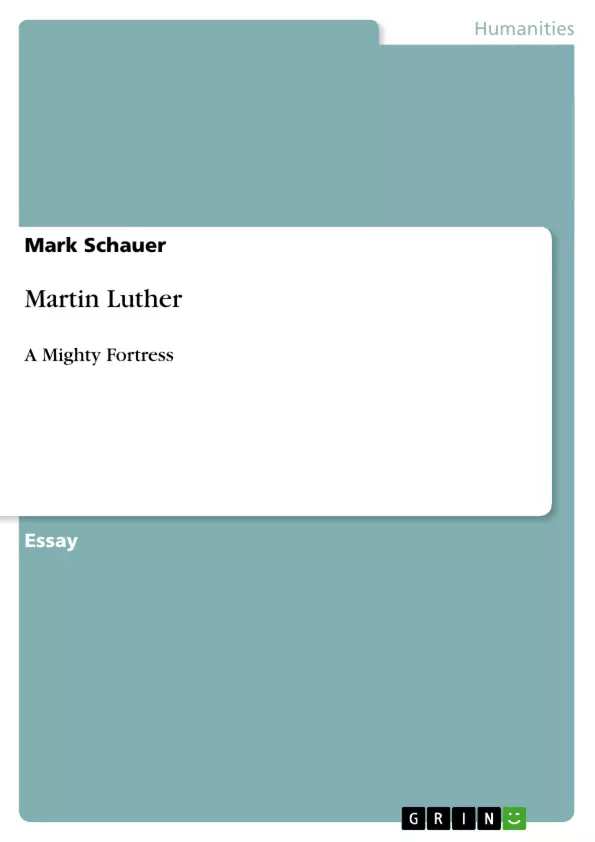Martin Luther, the founder of Protestantism, is often considered the man who ended the Middle Ages and ushered in the Renaissance. Indeed, Luther’s great impulses, “a reverence for authority, a vehement spirit, a cutting wit, a special talent for obscenity, and, most important, a contempt for sinful human nature, coupled with a profound and melancholy awareness of the body’s fate at death,” combine the best and worst of both epochs. (86) His attempt to roll Christian doctrine back to the days of St. Paul of Tarsus were viewed as heretical by the Church he had once fervently believed in. He eventually lambasted Jews and, especially, the Pope in the most vehement words and obscene imagery he could muster. He was a scriptural fundamentalist who believed bigamy and polygamy were acceptable in that they were not explicitly condemned in the Bible, yet felt adultery should be punished by death. Scholars consider his influence on the German language comparable to Shakespeare’s on English. His fight against the papacy inspired peasant revolts against the entire social order, which Luther explicitly rejected. He disbelieved in the geographic reality of hell and purgatory, but believed in the existence of witchcraft and sorcery. He was complex and contradictory, but profoundly influential.
Inhaltsverzeichnis (Table of Contents)
- Early Life and Education
- Monastic Life and Ordination
- Wittenberg and the Rise of Luther
- The Ninety-five Theses and the Indulgence Controversy
- The Diet of Worms
Zielsetzung und Themenschwerpunkte (Objectives and Key Themes)
This work explores the life and ideas of Martin Luther, a pivotal figure in the Reformation. The text aims to provide a comprehensive understanding of Luther's early life, his transition to monasticism, his intellectual development, and his controversial role in challenging established Church doctrine. Key themes include:- Luther's personal and intellectual journey
- The role of scripture in Luther's theology
- The controversy surrounding indulgences
- The Diet of Worms and Luther's defiance of the Church
- Luther's impact on the German language and social order
Zusammenfassung der Kapitel (Chapter Summaries)
Early Life and Education
This chapter delves into Luther's early life, focusing on his upbringing, education, and the events that shaped his worldview. It describes his father's occupation, the strict discipline he endured, and his academic achievements, including his Master's degree. The chapter highlights the importance of religious experience in Luther's life, particularly the fear of death that shaped his theology.Monastic Life and Ordination
This chapter details Luther's decision to become a monk, his choice of the Augustinian order, and his ordination as a priest. It discusses the role of his superior, Johann von Staupitz, in recognizing Luther's intellectual abilities and guiding his spiritual development. The chapter also explores Luther's commitment to the Scriptures and his early challenges to established Church doctrine.Wittenberg and the Rise of Luther
This chapter describes Luther's time at the University of Wittenberg, where he taught Aristotle's ethics, developed his theological ideas, and gained a platform to articulate his views. It explores his intellectual growth, his close relationship with Staupitz, and his growing influence within the university community.The Ninety-five Theses and the Indulgence Controversy
This chapter focuses on the controversy surrounding indulgences and the publication of Luther's Ninety-five Theses. It discusses the practice of selling indulgences, Luther's opposition to it, and the specific criticisms he raised against the Church's doctrine. The chapter examines the impact of the Theses, the reaction from the Church and others, and Luther's growing defiance.The Diet of Worms
This chapter details the Diet of Worms, where Luther was summoned to defend his beliefs before Emperor Charles V. It explores the events leading up to the Diet, including Luther's excommunication, his appearance before the Emperor, and his refusal to recant his views. The chapter examines the consequences of Luther's defiance and his impact on the course of religious history.Schlüsselwörter (Keywords)
The primary keywords and focus topics of this text include: Reformation, Martin Luther, theology, Scripture, indulgences, the Ninety-five Theses, the Diet of Worms, Church doctrine, German language, social order, and religious history. These terms encapsulate the central themes and concepts explored in the work, including Luther's theological views, the controversy surrounding indulgences, and the impact of his actions on the religious and social landscape of Europe.Frequently Asked Questions
Why is Martin Luther considered the founder of Protestantism?
Luther challenged the established Catholic Church doctrine, particularly regarding the authority of the Pope and the necessity of Scripture, leading to the Reformation.
What were the Ninety-five Theses?
They were a list of propositions for academic debate written by Luther in 1517, primarily attacking the Church's practice of selling indulgences.
What happened at the Diet of Worms?
In 1521, Luther was summoned before Emperor Charles V. He famously refused to recant his writings, leading to his excommunication and the formal split from the Church.
How did Martin Luther influence the German language?
His translation of the Bible into the vernacular is considered to have a foundational impact on the German language, comparable to Shakespeare's influence on English.
What was Luther's view on the authority of Scripture?
Luther was a scriptural fundamentalist who believed that the Bible was the ultimate authority for Christian faith, often rejecting Church traditions not explicitly found in the text.
- Quote paper
- Mark Schauer (Author), 2008, Martin Luther , Munich, GRIN Verlag, https://www.grin.com/document/230281



